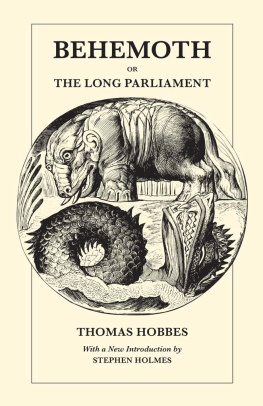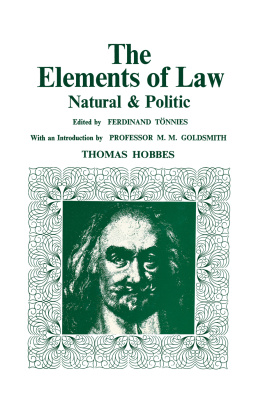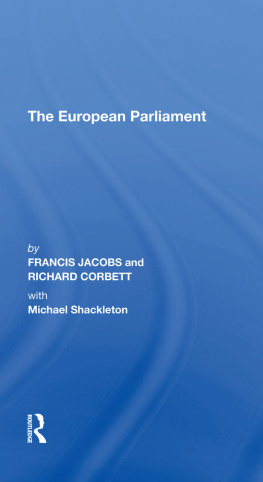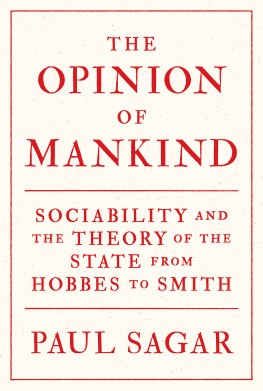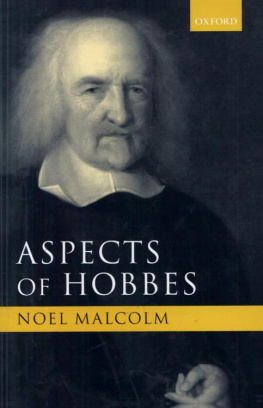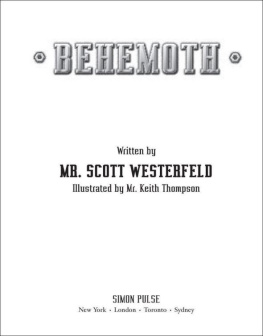Hobbes - Behemoth or The Long Parliament
Here you can read online Hobbes - Behemoth or The Long Parliament full text of the book (entire story) in english for free. Download pdf and epub, get meaning, cover and reviews about this ebook. year: 2014, publisher: University of Chicago Press, genre: Art. Description of the work, (preface) as well as reviews are available. Best literature library LitArk.com created for fans of good reading and offers a wide selection of genres:
Romance novel
Science fiction
Adventure
Detective
Science
History
Home and family
Prose
Art
Politics
Computer
Non-fiction
Religion
Business
Children
Humor
Choose a favorite category and find really read worthwhile books. Enjoy immersion in the world of imagination, feel the emotions of the characters or learn something new for yourself, make an fascinating discovery.
Behemoth or The Long Parliament: summary, description and annotation
We offer to read an annotation, description, summary or preface (depends on what the author of the book "Behemoth or The Long Parliament" wrote himself). If you haven't found the necessary information about the book — write in the comments, we will try to find it.
Hobbes: author's other books
Who wrote Behemoth or The Long Parliament? Find out the surname, the name of the author of the book and a list of all author's works by series.
Behemoth or The Long Parliament — read online for free the complete book (whole text) full work
Below is the text of the book, divided by pages. System saving the place of the last page read, allows you to conveniently read the book "Behemoth or The Long Parliament" online for free, without having to search again every time where you left off. Put a bookmark, and you can go to the page where you finished reading at any time.
Font size:
Interval:
Bookmark:
The University of Chicago Press, Chicago 60637
The University of Chicago Press, Ltd., London
1990 by The University of Chicago
All rights reserved. Published 1990
Printed in the United States of America
09 08 07 5 6 7 8
ISBN 978-0-226-22984-3 (e-book)
Library of Congress Cataloging-in-Publication Data
Hobbes, Thomas, 15881679.
Behemoth; or, The long Parliament / Thomas Hobbes ; edited by Ferdinand Tnnies ; with an introduction by Stephen Holmes.
p. cm.
Reprint. Originally published: London: Simpkin, Marshall, 1889.
ISBN 0-226-34544-0
1. Great BritainHistoryPuritan Revolution, 16421660. 2. Great BritainPolitics and government16421660. 3. Great Britain, ParliamentHistory17th century. I. Tnnies, Ferdinand, 18551936. II. Title. III. Title: The long Parliament.
DA400.H6 1990
941.06dc20
90-10875
CIP
 The paper used in this publication meets the minimum requirements of the American National Standard for Information SciencesPermanence of Paper for Printed Library Materials, ANSI Z39.48-1992.
The paper used in this publication meets the minimum requirements of the American National Standard for Information SciencesPermanence of Paper for Printed Library Materials, ANSI Z39.48-1992.
Portions of the appeared in the essay Political Psychology in Hobbess Behemoth, published in Thomas Hobbes and Political Theory, edited by Mary G. Dietz, 1990 by the University Press of Kansas. Reprinted by permission of the publisher.
BEHEMOTH
or
THE LONG PARLIAMENT

Thomas Hobbes
Edited by
Ferdinand Tnnies
With an Introduction by
Stephen Holmes
The University of Chicago Press
Chicago and London
.
INTRODUCTION
BEHEMOTH was completed in manuscript around 1668, when Thomas Hobbes was almost eighty years old. Some pirated editions were published in the late 1670s; but an authorized version of the book was not printed until 1682. In a letter of 19 June 1679, written a few months before his death, Hobbes explained the frustrating delay:
I would fain have published my Dialogue of the Civil Wars of England, long ago; and to that end I presented it to his Majesty: and some days after, when I thought he had read it, I humbly besought him to let me print it; but his Majesty, though he heard me graciously, yet he flatly refused to have it published.
Charles II may have hesitated to license the work, despite its outspoken partisanship of the royalist cause, because of its equally outspoken, but politically awkward, anticlericalism.
Hobbes had developed an analytical framework for discussing sedition, rebellion, and the breakdown of authority in earlier works, particularly in De Cive (1642) and Leviathan (1651). His decision, late in life, to provide an account of the political convulsions that struck England between 1640 and 1660 gave him the opportunity to apply this framework historically. The book he dictated (reprinted here from Ferdinand Tnniess edition of 1889) is cast as a discussion between a master, A, and his pupil, B. Unlike a straightforward narrative, the dialogue format allowed Hobbes to dispel the naavet of an inexperienced listener, while drawing useful lessons from events. It was a role he manifestly enjoyed.
Hobbes had lived in exile in France throughout the 1640s. His knowledge of the central episodes recounted in Behemoth, therefore, was almost wholly secondhand. Personal remoteness from the scene was of little importance, however. For Hobbes was concerned with the history, not so much of those actions that passed in the time of the late troubles, as of their causes, and of the councils and artifice by which they were brought to pass (45). Civil war broke out because key actors were bewitched by irrational passions and tragically misled by doctrinal errors.
The book is divided into four parts, or dialogues. Roughly speaking, the first dialogue contains Hobbess analysis of the seed of rebellion, the civil wars long-term ideological origins, with emphasis on political and theological opinions. In the second dialogue, A and B concentrate on the growth of this seed, especially on the strategies of those who undermine and destroy political authority. The stress here falls on the art of words by which the people are indoctrinated and seduced. And the last two dialogues are devoted to a schematic chronicle of events between 1640 and 1660, interlarded, of course, with numerous philosophical commentaries and detours.
The biblical creature Behemoth (apparently a giant ox, hippopotamus, or elephant) appears in Job 40, immediately prior to the famous and mysterious passage about that frightening sea beast Leviathan, king over all the children of pride (Job 41:34), whom Yahweh alone, and no man, can control. Whatever the two creatures signify in the Old Testament, Hobbes employed Leviathan as a symbol for the peacekeeping state and Behemoth as a symbol for rebellion and civil war. In the end, Behemoth did not become the name of a book aimed at refuting Leviathan, but rather of a book aimed at excoriating Leviathans enemies.
As Hobbess mocking suggestion for a title indicates, he associated the monster of rebellion and civil war with religion, with Hobbess approach to social causality was accusatory. To identify a cause of rebellion was to arraign a culprit. Religious troublemakers were favored, but every party in the civil war was incriminated at one point or another.
Behemoth is a brilliantly written booka fierce, witty, biting royalist polemic. But what is its theoretical importance? Why does it remain essential reading for all students of Hobbes? There are two reasons, I think.
First, it explodes one of the most common and persistent errors of Hobbes scholarship. Even today, commentators continue to assert that Hobbes conceived man as an animal propelled exclusively by a desire for self-preservation. This assertion cannot survive a careful scrutiny of the relevant texts. Consider, for example, Hobbess striking claim that most men would rather lose their lives... than suffer slander.civil wars have raged throughout history. Mankind is insanely self-destructive because, among other reasons, human beings fear dishonor and damnation much more than they fear death. The main argument of Behemoth reinforces this insight. Indeed, the book contains one of Hobbess most explicit rejections of motivational reductionism. The shocking passage about Ethiopian kings who commit suicide on the command of unarmed priests, discussed below, is a stunning rebuttal of the claim that the fear of death is the fundamental and overpowering human motive. But the entire work testifies to Hobbess extraordinarily rich understanding of the human psyche. Human motivations are much too disorderly and perverse to be reduced to self-preservation or the rational pursuit of private advantage.
Behemoth is an indispensable work for a second reason as well. It provides a marvelously clear illustration of Hobbess theory of the origins and basis of political power. The most striking statement in the entire book is probably this: The power of the mighty hath no foundation but in the opinion and belief of the people (16). The ultimate source of political authority is not coercion of the body, but captivation of the mind. The subjective or psychological basis of authority provides the core of Hobbess political science. His obsession with religion can be understood only if we recognize the all-importance of opinion in his analysis of human behavior, especially in his explanation of obedience and rebellion. Behemoth, focused on seditious opinions, drives the point home unrelentingly. For that reason, too, it cannot be neglected by any serious student of Hobbes.
Next pageFont size:
Interval:
Bookmark:
Similar books «Behemoth or The Long Parliament»
Look at similar books to Behemoth or The Long Parliament. We have selected literature similar in name and meaning in the hope of providing readers with more options to find new, interesting, not yet read works.
Discussion, reviews of the book Behemoth or The Long Parliament and just readers' own opinions. Leave your comments, write what you think about the work, its meaning or the main characters. Specify what exactly you liked and what you didn't like, and why you think so.

